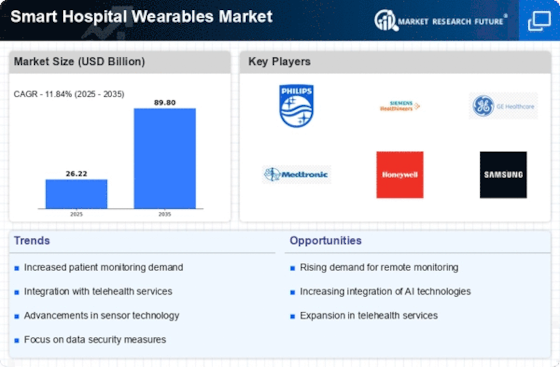Market Trends
Key Emerging Trends in the Smart Hospital Wearables Market
Smart hospital wearables are flooding the market, changing medical care delivery. Due to their ability to improve patient care, streamline work procedures, and provide continuous health information, these innovative medical devices are growing in popularity. Wearable devices are becoming more popular among doctors and patients. From smartwatches to wellness monitors, these devices can track vital signs, work, and medical issues.
With the growing need for specialized and persistent medical treatment, remote patient monitoring is becoming more popular. Medical providers may remotely monitor patients' health and reduce hospital readmissions with smart hospital wearables. This trend matches the larger transition toward esteem-based treatment and patient-driven medical services. Integration of smart wearables becomes crucial as medical care systems strive to become more efficient and patient-centered.
Another trend in smart hospital wearables is interoperability. The need for reliable data exchange across medical systems and devices is pushing interoperable wearables. Medical professionals may gain a thorough comprehension of information, enabling more informed navigation and consistent results. Medical services sector interoperability is being advanced by normalization and open-stage biological systems.
Artificial inteeligence and AI are also increasing in smart healthcare wearables. These developments allow wearables to analyze massive datasets and provide memorable experiences. Wearables with computer-based intelligence can identify physiological patterns to detect and prevent early sickness. From diagnosis to therapeutic plans, computer-based intelligence-driven wearables improve medical care.
Smart hospital wearables market security and protection are key considerations. As these devices collect sensitive health data, patient data security is a top priority. To prevent illegal access to patient data, producers are investing in encryption and verification. Administrative organizations are also addressing these concerns by implementing medical data use and security guidelines.
Innovation groups and medical care suppliers are collaborating more in the smart hospital wearables sector. These firms aim to combine mechanical and medical services expertise to provide innovative solutions. Joint efforts develop more simple, clinically useful wearables and integrate them into clinical practice.


















Leave a Comment